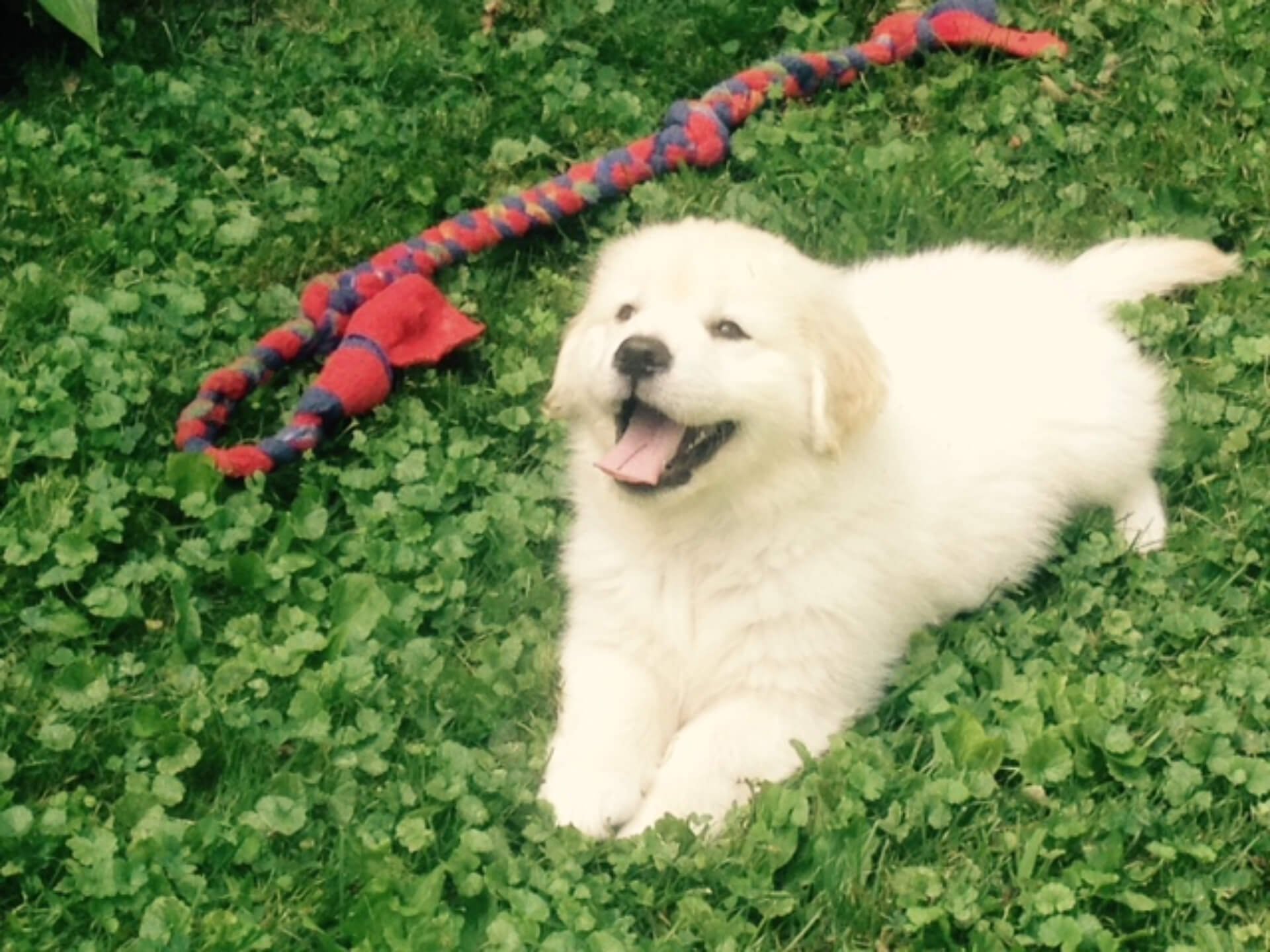Dog Training Maisie and the Power of Name-Calling
We do not see things as they are, we see them as we are.—Talmudic saying
Our new Golden Retriever puppy is nearly six months old and her learning experiences are our learning experiences. Five times a day she whimpers to go out; five times a day we tell her: Not now, Maisie — all three of us learning what to expect from each other concerning patience.
Even though she is our fourth Golden in a long line of beloved earlier dogs, the art of dog training and the knowledge and understanding of canine behavior has exponentially increased since our last dip into dog parenting. This, I think, follows the trend in childrearing — hundreds of “experts” with completely contradictory advice: Have the baby sleep in your bed; never let the baby sleep in your bed.
During the first weeks of Maisie’s transition from being a littermate of ten to the solo dog in our universe, she was the most adorable, cuddly, sweet-tempered puppy, but after another week or so my husband and I began noticing unpleasant behaviors. Take away a toy or a stick and Maisie’s irresistibly cute puppy face might morph into what looked like a snarl. I’m talking a display of fangs, which seemed more than mouthy puppy frolics. Cartoon dogs bury their bones all the time, but when real dogs run out the door, bone in mouth, and appear to be digging to China, growling if someone gets near, one gets worried. Our hands and arms bore scratches and scabs, and these made us ever more cautious in approaching our new pet.
And so we phoned an expert. For privacy purposes I’ll call this person Susan. Susan responded to our SOS immediately and arrived with an upbeat attitude — You can handle this. We can retrain Maisie — and oodles of information. Our sighs of relief must have been audible when on the first visit Susan, modeling a cheery dominatrix, coerced Maisie into polite manners. Susan managed this by using force. I don’t mean she used brutality; let’s just say she was out-bullying the bully, showing Maisie who was boss. Susan was not a big woman, but she knew how to square her shoulders and maximize her voice. At one point in the training session, she put a headscissors lock on Maisie and called her “a stubborn little devil.”
We’d never had to use force with our other dogs and were a bit horrified, but maybe this dog needed more discipline. Maybe we were the problem. Maybe we needed to buck up, tolerate less, use tough love. We felt badly about ourselves. How did we know what was right? We weren’t the experts, after all.
That night we read Susan’s assessment of Maisie’s problems. It read like a profile of a kid destined for prison: hoarding/stealing, aggressiveness, dominance issues. Hoarding! My gawd, we were not just dealing with the ups and downs of normal puppydom, we had a delinquent dog on our hands. This was not what we had opted for. Yikes! Would Maisie be a problem dog for the rest of her life? Were we capable of training her? Did we want that responsibility? Our attitude toward her had quickly changed from devotion to disappointment and distress.
Later that night, my husband and I held each other and considered returning Maisie to her breeder. Out of desperation I suggested we try another professional. This time we chose a dog behaviorist, not a dog trainer. The difference is significant and too long to go into here, but our second expert arrived with a bag full of dog treats and toys, a curious, attentive, non-judgmental manner and ready praise on her lips. This may sound Disneyish, but Maisie responded immediately to her calm, patient, non-militaristic approach. We learned that very smart dogs like Maisie love to learn. Their puppy energy can be directed toward the playful learning of games and commands for which they earn praise and hot dog rewards. We learned that the idea of dominant and non-dominant dogs is outdated and that dog behaviorists understand possession aggression as resource guarding. Dogs with leadership qualities, dogs that might be the leaders of their packs in the wild, have an instinct to guard and bury their food because they will be responsible for helping to feed the pack. Bravo for them!
This gets me to my takeaway point: how labeling … children, dogs, other ethnicities, races, genders … affects our feelings and emotions about them. What we call others and the spin we give to those names affects how we see and respond. Which sounds better to you: possession aggression or resource guarding? How about this: Your child is bossy. Your child shows leadership ability. Your child is hyperactive. Your child is energetic. Name-calling can reflect our basest instincts and our uncanny proclivity to project onto others exactly the aspects we dislike in ourselves. Or it can represent our better angels. We can choose. If we apply this insight to the current world stage, doesn’t it seem we have entered a time of malicious name-calling? Maybe we should consider that what we vilify in others might be something we fear in ourselves.
P.S. Maisie has won our hearts. She shows absolutely no signs of unwarranted aggression. She is the dog of our dreams.




